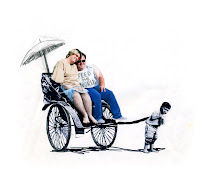that i can't blink
without writing:
nothing happens.
the meaning-stuffed-mind
sits satiated
upon its toilet-throne -
erm, chair
- in consternation
linguistically, neurally, constipated:
where's the _________ fiber?
so that my feelings may pass
so that i may feel the cleanliness and solitude
of an enematic colon.
alas -
more marination needed
more time for the parts of my whole
to write their reports,
talk to witnesses -
or: more time.
just: more time."
"what is the sheer passage of time
but the heroic villain,
the will to ignorance?"
but the heroic villain,
the will to ignorance?"
"NO!
we must choose -
whether sedentary, on a paved road or
with a machete in the brush.
And so it is with my salty blue pen and blood-lined paper:
I can't control that
I can't write when
I think I should.
But I can accept it,
Waiting for release,
Enjoying the suffering,
That only precedes meaning."
"... "
"No,
We can."

1 comment:
steven, i like the allusion you paint of cooking the mind. but if you are going to frame such a great theory- follow up on it. link it between each stanza. stanza means house, and i would take that in the literal sense. although poetry is wording, think of this visually. as words are mainly visual to poets-- white space, experimental play, etc.
perhaps play with the stanza idea/ shape a neighborhood. perhaps your need extra juice from one stanza in order for that meat to cook properly. does that make sense? or too much metaphor there. i mean it. and the quotes. i like not understanding at times. but here, i feel like the author is not even sure and has interspersed several meanings throughout the poem/ different stories, theories, theses. i just think it conflicts.
but i like it. it is a great beginning. the doorway into something grand. keep it up!
Post a Comment